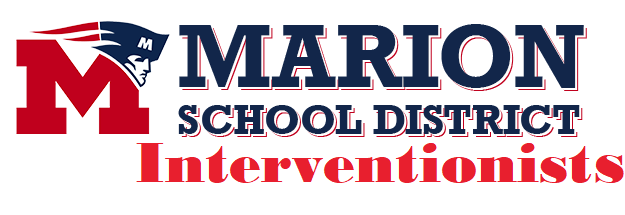MEET YOUR INTERVENTIONISTS
Jennifer Coats - jcoats@msd3.org
Elizabeth Creel - ecreel@msd3.org
Mallory Cupples - mcupples@msd3.org
Amber Jones - ajones@msd3.org
Deirdre Love - dlove@msd3.org
Emily Stewart - estewart@msd3.org
Sheri Tacker - stacker@msd3.org

MSD SCHOOL INTERVENTIONISTS
Marion School District interventionists are certified teachers who work with classroom teachers and administrators to identify students who are at risk for poor learning outcomes. The interventionists monitor student progress, provide evidence-based interventions and adjust the intensity and nature of interventions depending on a student’s responsiveness and identify students with learning disabilities.
Our interventionists are experienced teachers specifically trained to evaluate students academic performance. Graduate-level education and teaching experience help a school interventionist discern various ways to reinforce positive behavior and limit issues that negatively impact behavior.
AT A GLANCE
An instructional intervention is a program or set of steps to help students improve in reading and math.
Instructional interventions use small group instruction using research-driven strategies and instructional techniques.
They’re designed so that you and the school can track your child’s progress.
WHAT IS AN INSTRUCTIONAL INTERVENTION?
An instructional intervention is a specific program or set of steps to help students improve in an area of need. Kids can have many different types of needs.
Instructional interventions aren’t behavioral interventions. They’re aimed at academics (They’re sometimes called academic interventions.)
Instructional interventions are:
Intentional: They’re aimed at a particular challenge.
Specific and formalized: An intervention lasts a certain number of weeks or months and is reviewed at set intervals.
Even though instructional interventions are formalized, they can be flexible, too. For example, if a program isn’t helping a student, the school might change it. This could mean increasing the amount of time a student gets reading support each week. Or it might mean getting more intense support—like moving from small group instruction to one-on-one help.
The process of using more and more intense interventions is the basis for response to intervention(RTI). (Some schools use a multi-tier system of supports, or MTSS.) Many schools use these approaches to help struggling students.
WHAT AN INSTRUCTIONAL INTERVENTION ISN’T
An instructional intervention isn’t just a strategy. People sometimes confuse strategies with instructional interventions. But there are important differences. A strategy is a set of methods or activities to teach students a skill or concept.
An instructional intervention may include strategies. But not all strategies are interventions. The main difference is that an instructional intervention is formalized, aimed at a known need, and monitored. A strategy, on the other hand, can be informal and isn’t always tracked.
